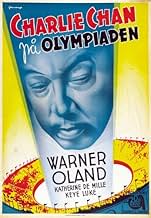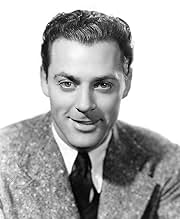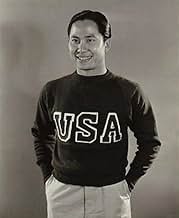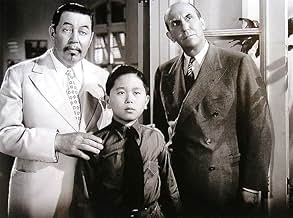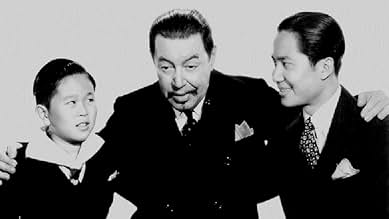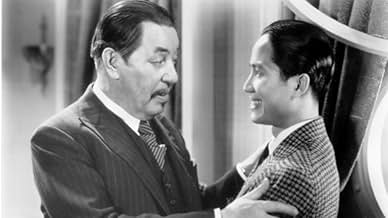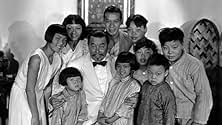IMDb RATING
7.0/10
1.9K
YOUR RATING
When a strategically important new aerial guidance system is stolen, Charlie traces it to the Berlin Olympics, where he has to battle spies and enemy agents to retrieve it.When a strategically important new aerial guidance system is stolen, Charlie traces it to the Berlin Olympics, where he has to battle spies and enemy agents to retrieve it.When a strategically important new aerial guidance system is stolen, Charlie traces it to the Berlin Olympics, where he has to battle spies and enemy agents to retrieve it.
Frederik Vogeding
- Captain Strasser
- (as Fredrik Vogeding)
William Begg
- Minor Role
- (uncredited)
Brooks Benedict
- Zaraka Henchman
- (uncredited)
Stanley Blystone
- New York Policeman
- (uncredited)
Walter Bonn
- Polizei Officer
- (uncredited)
Don Brodie
- Radio Announcer
- (uncredited)
Featured reviews
An experimental plane's guidance system is stolen and Charlie Chan's on the case. He follows the clues to Berlin, where the 1936 Olympic Games are being held. Amusingly, "Number One Son" Lee Chan is a member of the U.S. Olympic Swim Team. He even wins! As usual, Warner Oland is a perfect Charlie Chan. In addition to Keye Luke's Lee, this time we get Charlie Chan, Jr. He's played by Layne Tom, Jr. and is all kinds of adorable. I wonder why he wasn't made a permanent part of the series because he's a lot of fun. Also includes one of the loveliest actresses to appear in the entire Chan series, Katherine DeMille. Hubba-hubba! She was the adopted daughter of Cecil B. DeMille and future wife of Anthony Quinn. There's also some nice support from reliable character actors C. Henry Gordon, John Eldredge, and Jonathan Hale. Good cast in this one.
This entry in the series is most notable for it taking place during the 1936 Olympics, with footage from the games including Jesse Owens. Plus Charlie travels to Berlin on the Hindenburg. It also features pre-WWII German police portrayed in a much more sympathetic light than they would be just a few years later. Although, it should be noted Inspector Strasser (Frederik Vogeding) of the German police is kind of a boob ("Things like this cannot happen in Berlin!"). An excellent entry in the Charlie Chan series with high entertainment value and some added historical curiosity. Fans should love it.
This entry in the series is most notable for it taking place during the 1936 Olympics, with footage from the games including Jesse Owens. Plus Charlie travels to Berlin on the Hindenburg. It also features pre-WWII German police portrayed in a much more sympathetic light than they would be just a few years later. Although, it should be noted Inspector Strasser (Frederik Vogeding) of the German police is kind of a boob ("Things like this cannot happen in Berlin!"). An excellent entry in the Charlie Chan series with high entertainment value and some added historical curiosity. Fans should love it.
... that being that the film is set at the 1936 Olympics in Berlin.
A plane is doing a test flight with a brand new invention vital to the defense of the United States when the plane disappears. The audience can see inside the cockpit that someone hiding inside the plane overpowers the actual pilot, but the cast is denied this knowledge. Charlie Chan finds the plane with the body of the pilot nearby while on a fishing trip with one of his younger sons. A careful investigation leads suspicions to somebody who is part of the American Olympic team, and thus he has left Hawaii for Berlin. Therefore Chan goes to Berlin himself to continue the investigation. A further complcation is that oldest Chan son Lee is a competitor in the games there.
Set in 1936, there is quite a bit of stock footage of the 1936 Olympic games. There is one shot with the torch bearer running down the stairs with people in the crowd on either side of him clearly performing the Nazi salute. The Berlin police are portrayed as pedantic stumble bums whose hearts are in the right place and who act and dress like the Kaiser is still alive versus the rather lethal group that they had become by 1936 - not a group you'd want to tangle with.
What is really ironic is that Charlie postulates that the radio control device will be sold in Germany to some unnamed group of international terrorists because they feel "safe" in Germany during the games because of the presence of so many people from many nations. It's so interesting to see how the United States and the rest of the world did not take Hitler's Germany seriously until it was almost too late.
A plane is doing a test flight with a brand new invention vital to the defense of the United States when the plane disappears. The audience can see inside the cockpit that someone hiding inside the plane overpowers the actual pilot, but the cast is denied this knowledge. Charlie Chan finds the plane with the body of the pilot nearby while on a fishing trip with one of his younger sons. A careful investigation leads suspicions to somebody who is part of the American Olympic team, and thus he has left Hawaii for Berlin. Therefore Chan goes to Berlin himself to continue the investigation. A further complcation is that oldest Chan son Lee is a competitor in the games there.
Set in 1936, there is quite a bit of stock footage of the 1936 Olympic games. There is one shot with the torch bearer running down the stairs with people in the crowd on either side of him clearly performing the Nazi salute. The Berlin police are portrayed as pedantic stumble bums whose hearts are in the right place and who act and dress like the Kaiser is still alive versus the rather lethal group that they had become by 1936 - not a group you'd want to tangle with.
What is really ironic is that Charlie postulates that the radio control device will be sold in Germany to some unnamed group of international terrorists because they feel "safe" in Germany during the games because of the presence of so many people from many nations. It's so interesting to see how the United States and the rest of the world did not take Hitler's Germany seriously until it was almost too late.
While Charlie's multi-talented son Lee is traveling by ship to Europe as a member of the US Olympics team, his father searches at home for a newly invented remote control device for planes which is probably on its way to be sold to some obscure foreign power (the political tensions all over the world are already perceptible three years before the beginning of WW II, but the movie doesn't show any affiliation or enmity yet) - and happens to be on the same ship with Lee and his friends, guarded by a 'femme fatale' (Cecil B. DeMille's adoptive daughter Katherine in her probably best role) who arouses the dislike of the young athletes only because she keeps flirting with one of them although he's got a steady girlfriend...
Charlie, in the meantime, has found out the 'traveling route' of the device, and 'overtakes' it, first by plane and then aboard the famous zeppelin 'Hindenburg' (which would crash only a year later). But from the moment on that the athletes (one of whom 'smuggled' it into the country without even knowing it), the spies and the police mingle, there is constant confusion, until Charlie seems to have it safely in the hands of the German police authorities - BUT the spies have got Lee...
From this moment, we really FEEL the agony of Charlie as a father, and his dilemma of handing the important invention over to the spies or risking his son's life - certainly a very earnest and dramatic entry in the 'Charlie Chan' movies, but not without its lighter moments; and besides that, we get a glimpse of the 1936 Olympics in Berlin - a real time document.
Charlie, in the meantime, has found out the 'traveling route' of the device, and 'overtakes' it, first by plane and then aboard the famous zeppelin 'Hindenburg' (which would crash only a year later). But from the moment on that the athletes (one of whom 'smuggled' it into the country without even knowing it), the spies and the police mingle, there is constant confusion, until Charlie seems to have it safely in the hands of the German police authorities - BUT the spies have got Lee...
From this moment, we really FEEL the agony of Charlie as a father, and his dilemma of handing the important invention over to the spies or risking his son's life - certainly a very earnest and dramatic entry in the 'Charlie Chan' movies, but not without its lighter moments; and besides that, we get a glimpse of the 1936 Olympics in Berlin - a real time document.
Another well-directed Warner Oland Chan filmmaking full use of stock footage from 1936 Berlin Olympics and the dirigible Hindenburg. Chan is on trail of stolen aircraft autopilot and killers who will make an attempt on his life and again kidnap No. 1 son Lee. Keye Luke is allowed to play his part without disguise and too much oriental racial humor. Good supporting cast and great shots of the game ceremonies and Jesse Owen in the relay race. For those who want to view more of these games, without Chan, see Leni Riefenstahl's Olympia 1. Teil - Fest der Völker and Olympia 2. Teil - Fest der Schönheit (1938). Continuity with other films suffers when Layne Tom, Jr. is introduced as #2 son Charlie. We have seen much older sons in his family at the circus and we will later see Victor Sen Yung as #2 son Jimmy and even later as Tommy Chan.
This is a good mystery, but once again it is impossible to share in the clues that only Chan can see and from that catch the thief and murderer. `When all players possess suspicious cards, good idea to have joker up sleeve.' Story line is somewhat believable enough for a good afternoon's watching. Concluding scenes have oriental detective admit he is willing to risk loss of son and self in order to maintain honor and loyalty to United States. One of the best in the series. Recommended.
This is a good mystery, but once again it is impossible to share in the clues that only Chan can see and from that catch the thief and murderer. `When all players possess suspicious cards, good idea to have joker up sleeve.' Story line is somewhat believable enough for a good afternoon's watching. Concluding scenes have oriental detective admit he is willing to risk loss of son and self in order to maintain honor and loyalty to United States. One of the best in the series. Recommended.
Some unnamed source at IMDb alleges that CHARLIE CHAN AT THE OLYMPICS, a film capitalizing on the then recent 1936 Berlin Olympics (taking place in Germany under Chancellor Hitler) and released on May 21, 1937, in the U.S and in the early fall of that year in Europe, was "pulled from circulation shortly after its release because it takes place in Nazi Germany." Could someone please define "shortly after its release"? The film, while sympathetically portraying the civilian police force in Berlin (interestingly played for irony and possibly surprise or subtext by frequent film villain Frederik Vogeding), pointedly incorporated actual newsreel footage of Jessie Owens' Olympic triumph which was so upsetting to the Herr Hitler. The film plot had considerable hurdles to surmount in avoiding the identification of the foreign power trying to steal the "McGuffin" military device. Most U.S. or British films of the period would have been more blatant in assuming the national guilty party, but Germany was still a major market for U.S. motion pictures (even if the Chan character himself must have been an anathema to Nazi Party leadership).
Even with the unsettling Anschlus in Austria and the Munich Crisis over the dismembering of Czechoslovakia; with the invasion of Poland and the formal start of European hostilities in World War II still a little more than a year away (U.S. entry into the conflict more than four years away!), America and much of the rest of the world was doing its best to ignore distressing realities within the Reich. While CHARLIE CHAN AT THE OLYMPICS had to do a fine dance to play to that desire to turn a blind eye, it largely succeeded. It is difficult to believe that 20th Century Fox would withdraw an entry in the wildly popular Chan series in anything which could be realistically considered "soon" (anything less than six months). A specific DATE of the withdrawal would be appreciated.
While the film over all may be one of the lesser Chan efforts, it has moments (the initial set-up in the U.S., the travelogue race to Berlin, the scenes in the Olympic Stadium and the final confrontation with the killers) which are as good as any in the canon. To be dismissed as "pulled from circulation shortly after its release" if it is demonstrably not true would be unfortunate.
Even with the unsettling Anschlus in Austria and the Munich Crisis over the dismembering of Czechoslovakia; with the invasion of Poland and the formal start of European hostilities in World War II still a little more than a year away (U.S. entry into the conflict more than four years away!), America and much of the rest of the world was doing its best to ignore distressing realities within the Reich. While CHARLIE CHAN AT THE OLYMPICS had to do a fine dance to play to that desire to turn a blind eye, it largely succeeded. It is difficult to believe that 20th Century Fox would withdraw an entry in the wildly popular Chan series in anything which could be realistically considered "soon" (anything less than six months). A specific DATE of the withdrawal would be appreciated.
While the film over all may be one of the lesser Chan efforts, it has moments (the initial set-up in the U.S., the travelogue race to Berlin, the scenes in the Olympic Stadium and the final confrontation with the killers) which are as good as any in the canon. To be dismissed as "pulled from circulation shortly after its release" if it is demonstrably not true would be unfortunate.
Did you know
- TriviaWhile several views of swastika flags were blotted out, other instances of Nazism were missed, e.g. as the German torch bearer turns left into the grand stadium avenue, in the lower left corner of screen can be seen four militarily-clad males giving the Nazi salute; plus as the same torch bearer descends the stadium steps all the youths lining the way are giving the Nazi salute, even with four outstretched arms in very front of the camera.
- GoofsWhen Charlie's son brings him a picnic basket he says he was bringing "cut up tea and sandwiches" when clearly he meant "tea and cut up sandwiches."
- Quotes
Charlie Chan Jr: Gee, Pop, they're having as hard a time finding that plane as we are catching fish.
Charlie Chan: Fish in sea like flea on dog - always present but difficult to find.
- ConnectionsEdited into Who Dunit Theater: Charlie Chan at the Olympics (2015)
- How long is Charlie Chan at the Olympics?Powered by Alexa
Details
- Release date
- Country of origin
- Language
- Also known as
- Charlie Chan at the Olympics
- Filming locations
- Production company
- See more company credits at IMDbPro
- Runtime1 hour 11 minutes
- Color
- Aspect ratio
- 1.37 : 1
Contribute to this page
Suggest an edit or add missing content

Top Gap
By what name was Charlie Chan aux jeux olympiques (1937) officially released in India in English?
Answer
